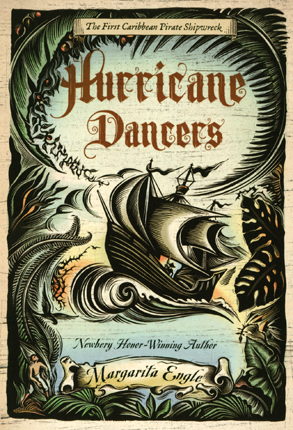Full Text Reviews: Booklist - 01/01/2011 *Starred Review* Engle, whose award-winning titles include the Newbery Honor Book, The Surrender Tree (2008), offers another accomplished historical novel in verse set in the Caribbean. Young Quebrado’s name means “the broken one,” a child “of two shattered worlds.” The son of a Taíno Indian mother and a Spanish father, he is taken in 1510 from his village on the island that is present-day Cuba and enslaved on a pirate’s ship, where a brutal conquistador, responsible for thousands of deaths throughout the Americas, is held captive for ransom. When a hurricane destroys the boat, Quebrado is pulled from the water by a fisherman, Naridó, whose village welcomes him, but escape from the past proves nearly impossible. Once again, Engle fictionalizes historical fact in a powerful, original story. With the exception of Quebrado, all the characters are based on documented figures (discussed in a lengthy author’s note), whose voices narrate many of the poems. While the shifting perspectives create a somewhat dreamlike, fractured story, Engle distills the emotion in each episode with potent rhythms, sounds, and original, unforgettable imagery. Linked together, the poems capture elemental identity questions and the infinite sorrows of slavery and dislocation, felt even by the pirate’s ship, which “remembers / her true self, / her tree self, / rooted / and growing, / alive, / on shore.” - Copyright 2011 Booklist. School Library Journal - 03/01/2011 Gr 6–10—It's been said that history is written by the conquerors and, indeed, there are countless one-sided accounts of brave European explorers boldly "discovering" the New World. Here's a welcome antidote to all that biased mythology. Written in unrhymed verse and from alternating characters' perspectives, Hurricane Dancers provides a much more nuanced, personal, and thought-provoking imagining of what really happened when diverse cultures began colliding in the Caribbean in the late 15th and early 16th century. The story centers around a young slave dubbed el quebrado, "The Broken One," whose half-Spanish, half-Taíno Indian ancestry makes him critically valuable as a translator for the sailors, who exploit his skills to intimidate and enslave the Natives they encounter. He is a captive on a stolen pirate ship commanded by Bernadino de Talavera as the tale begins, but the tables turn when a hurricane dashes the vessel off a Caribbean Island. Quebrado, Bernadino de Talavera, and his brutal conquistador hostage Alonso de Ojeda all survive, but when the former commander once again tries to employ Quebrado's skills to dominate the Natives, the young man realizes that he not only has the power to refuse and reinvent himself, but also finds that he controls the fate of his former captor and his injured, unstable hostage. Unique and inventive, this is highly readable historical fiction that provides plenty of fodder for discussion.—Jeffrey Hastings, Highlander Way Middle School, Howell, MI - Copyright 2011 Publishers Weekly, Library Journal and/or School Library Journal used with permission. Bulletin for the Center... - 04/01/2011 In this free-verse novel, five voices, some drawn from history, some from legend, one invented for the book, alternate in a recreation of the first shipwreck of a pirate vessel in the Caribbean and the subsequent fate of its survivors. Fictional Quebrado, a bilingual boy of Spanish and Taino descent, has been kidnapped to serve as interpreter for the ship’s captain, Bernardino de Talavera, a failed planter turned pirate. Also on board is Alonso de Ojeda, a ruthless Venezuelan governor who has been poisoned by his indigenous subjects and is now held captive by Talavera. A hurricane destroys the ship, but Quebrado, rescued by a fisherman named Naridó, believes he has mercifully been freed by the disaster. The two villains wash ashore, though, and Quebrado must convince the trusting islanders of the danger they face by accepting the Spaniards into their communities. Based on the early sixteenth century shipwreck and on the legendary Cuban story of forbidden love between Naridó and Caucubú (who provides the fifth narrative voice here), this is both a taut adventure tale and a grim examination of the disastrous cultural contact between Europeans and the Caribbean islanders they promptly exploited or enslaved. The slender size and accessible format may help draw readers daunted by thicker materials, and the book would make an interesting companion to Dorris’ Morning Girl (BCCB 10/92). Substantial historical notes accompany the poems, and a pronunciation guide in the opening “Cast of Characters” list will be useful in mounting a readers theater performance. EB - Copyright 2011 The Board of Trustees of the University of Illinois. Loading...
|



